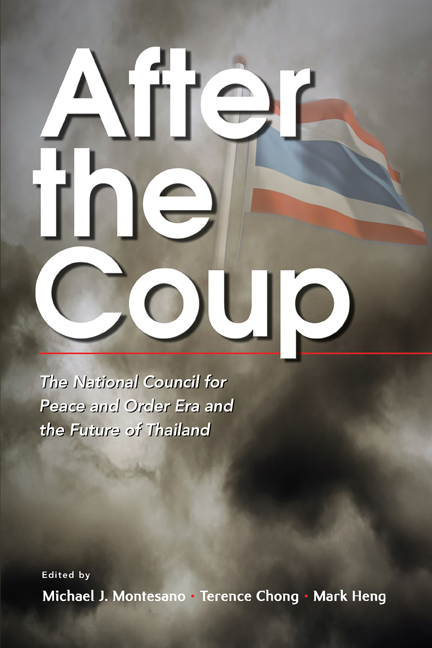Book contents
- Frontmatter
- Contents
- About the Contributors
- 1 Introduction: Thai Realities and Possibilities after the 22 May Coup
- 2 The Rise of the Thai Upper Middle Class and its Turn against Democracy
- 3 “We the Southerners Come to Protect the Nation and the King”: Southerners’ Political Rise and Regional Nationalism in Thailand
- 4 Exit, Voice, (Dis)loyalty? Northeast Thailand after the 2014 Coup
- 5 The Red Shirts and their Democratic Struggle in Northern Thailand, April 2010 – May 2015
- 6 The Shifting Battleground: Peace Dialogue in Thailand's Malay-Muslim South
- 7 Thailand's Zigzag Road to Democracy: Continuity and Change in Military Intervention
- 8 Murder and Regress: Violence and Political Change in Thailand
- 9 Thailand's Politics of Decentralization: Reform and Resistance before and after the May 2014 Coup
- 10 Change and Continuity in the Politics of the Media after the Coup
- 11 Thailand's Royal Democracy in Crisis
- 12 The Foreign Press and its Changing Perceptions of the Thai Monarchy
- 13 Thai Economic Growth: Retrospect and Prospect
- 14 Features and Challenges of an Ageing Population in Thailand
- 15 Conclusion: Thailand in Transition
- Bibliography
- Index
3 - “We the Southerners Come to Protect the Nation and the King”: Southerners’ Political Rise and Regional Nationalism in Thailand
Published online by Cambridge University Press: 23 May 2019
- Frontmatter
- Contents
- About the Contributors
- 1 Introduction: Thai Realities and Possibilities after the 22 May Coup
- 2 The Rise of the Thai Upper Middle Class and its Turn against Democracy
- 3 “We the Southerners Come to Protect the Nation and the King”: Southerners’ Political Rise and Regional Nationalism in Thailand
- 4 Exit, Voice, (Dis)loyalty? Northeast Thailand after the 2014 Coup
- 5 The Red Shirts and their Democratic Struggle in Northern Thailand, April 2010 – May 2015
- 6 The Shifting Battleground: Peace Dialogue in Thailand's Malay-Muslim South
- 7 Thailand's Zigzag Road to Democracy: Continuity and Change in Military Intervention
- 8 Murder and Regress: Violence and Political Change in Thailand
- 9 Thailand's Politics of Decentralization: Reform and Resistance before and after the May 2014 Coup
- 10 Change and Continuity in the Politics of the Media after the Coup
- 11 Thailand's Royal Democracy in Crisis
- 12 The Foreign Press and its Changing Perceptions of the Thai Monarchy
- 13 Thai Economic Growth: Retrospect and Prospect
- 14 Features and Challenges of an Ageing Population in Thailand
- 15 Conclusion: Thailand in Transition
- Bibliography
- Index
Summary
Two enduring popular images characterize the People's Democratic Reform Committee (PDRC), which led the rallies against the government of Prime Minister Yingluck Shinawatra in late 2013 and early 2014 that culminated in the 22 May coup. The first is that it was supported by Bangkok residents, especially the “educated urban middle class” and celebrities. Images of the PDRC's mid-day “Bangkok Shutdown” (patibatkan pit krung thep) rallies gaining the support of thousands of “office people” in Bangkok's business and commercial centres were widespread, as were images of celebrities taking part in and holding cultural activities at PDRC rallies. The second is Southerners’ support for the movement, that of both those travelling from the region to attend rallies in the capital and those residing in Bangkok. Images of tents offering Southern Thai food for free at PDRC rallies were highlighted, along with images of hundreds of Southerners taking trains to Bangkok to attend those rallies. These two popular images combined to create one of the PDRC as an alliance of Bangkokians and Southerners.
Such an alliance is of crucial importance to Thai politics for three reasons. First, it highlights the birth of a new “political actor”. While Bangkokians have as a group been a dominant actor in Thai politics for decades — from the “Black May” of 1992 through the anti-Thaksin People's Alliance for Democracy (PAD) in 2005–6 and 2008–11 — Southerners had never been the backbone or stood at the forefront of any political uprising until they vigorously took part in the rallies of the PDRC. Second, the alliance challenges the “Two Democracies” theory once widely held among observers of Thai politics. Rather than acting as rural people who voted for a government destined to be overthrown by Bangkokians, Southerners working through the PDRC joined Bangkokians in ousting the government voted in by people in and from the North and the Northeast. Third, the alliance challenged the notion long held among scholars, especially Thai scholars, of Southern Thailand. Instead of being “anti-state” with regionalism as a backdrop, Southerners emerged as champions of royal nationalism under the PDRC. “We the Southerners come to protect the nation and the king” is what one of them said with great pride when asked why she attended the PDRC's rallies.
- Type
- Chapter
- Information
- After the CoupThe National Council for Peace and Order Era and the Future of Thailand, pp. 58 - 89Publisher: ISEAS–Yusof Ishak InstitutePrint publication year: 2019

